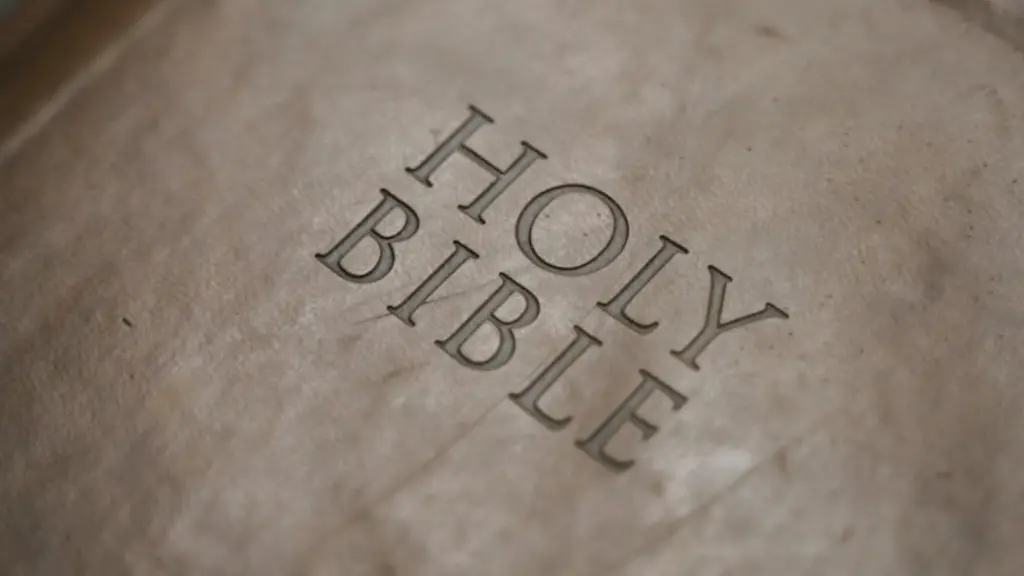Books that are not found in the Bible are known as the “apocryphal” or “deuterocanonical” books. These books have long been accepted as part of the Christian Scriptures by many, but not all, Christian traditions throughout history. In modern terms, they are often called the “deuterocanonical books” of the Old Testament.
The Apocrypha includes books and parts of books not found in other ancient versions of the Bible and not accepted by many Protestant churches. The Catholic and Orthodox churches, along with some others, believe these books are inspired and should be part of the Bible.
The Apocrypha includes books not found in the Jewish canon, such as 1 Maccabees, Judith, Tobit, and others. The Apocrypha also includes the Baruch books, which are not part of the Hebrew Bible, but are accepted by some Christian traditions.
Deuterocanonical books are texts that are widely accepted by some denominations of Christianity, but not by others. These include books such as Tobit, Judith, and the Wisdom of Solomon. They are also sometimes referred to as the “Apocrypha” or “hidden books”, although this is not technically accurate.
The Doctrine and Covenants, or D&C, is a book of modern revelation not found in the Bible. Published by The Church of Jesus Christ of Latter-day Saints, the Doctrine and Covenants is a collection of revelations given to modern prophets for the guidance of God’s people.
The book of Enoch is a pseudepigraphal book, attributed to Enoch, the great-grandfather of Noah. It contains writings from several authors, containing a mixture of myth, legend, history, and religious lore. It is not accepted by either the Jews or most Christian denominations, but is widely quoted in the New Testament.
The book of Jubilees is another pseudepigraphal book, attributed to Moses and written during the Babylonian Captivity. It contains a moral, religious, and historical account of Jewish history as recorded in the Bible, and includes several chapters describing various heavenly events.
The book of Jasher is a pseudepigraphal work whose existence is attested to in the Bible, but which is not accepted by either Jews or most Christian denominations. It is attributed to the legendary hero Jasher, son of Caleb, and allegedly contains a more accurate account of Jewish history than is found in the Bible.
The Lost Books
The Lost Books of the Bible are collections of works that were not included in the Biblical canon. While these books are not accepted by either Jews or most Christian denominations, they are still read by some people and are seen as having significant historical value for students of the Bible.
Some examples of the Lost Books include the Gospel of Thomas, the Apocalypse of Peter, the Prayer of Manasseh, and the Testament of Levi. While these books are not accepted as being part of the Biblical canon, they still have important historical value and are studied by scholars of religion.
The Secret Book of John is a Gnostic text attributed to John the Apostle. Written in the first or second century, it is not accepted as canonical by any major Christian denomination, but is still studied today for its insight into the Gnostic tradition.
New Testament Apocrypha
The New Testament Apocrypha refers to a collection of writings that were not included in the New Testament. While these books are generally not accepted as having any canonical value, they still carry significance for historians who are interested in the development of Christianity in the centuries after the death of Jesus.
Some examples of the New Testament Apocrypha include the Gospel of Thomas, the Gospel of Mary Magdalene, the Gospel of Peter, and the Acts of Peter and Paul. These books are not accepted by any major Christian denomination, but are still worth study for understanding the evolution of early Christian thought.
The Gospel of Judas is a non-canonical text discovered in the late 20th century that tells the story of the betrayal of Jesus from the perspective of Judas. It is not accepted as being part of the Biblical canon, but has been studied for its insight into Gnostic and early Christian ideas.
The Shepherd of Hermas is an early Christian work written by a Roman Christian at the end of the first century. Not accepted as part of the Biblical canon, it is still studied for its insight into the belief systems of the early church.
The Psalms of Solomon
The Psalms of Solomon are a set of 18 poems dating from the first century BCE. They are not accepted as being part of the Biblical canon, but are still studied by scholars for their insight into the history and culture of ancient Israel.
The Odes of Solomon are another set of early Christian poems written around the same time as the Psalms. They are not accepted by any church as being part of the Biblical canon, but they are studied by scholars of religion and are seen as having significant insight into the beliefs of early Christians.
The Testament of Abraham is an apocryphal work attributed to Abraham, the father of faith. Not accepted as part of the Biblical canon, it is still studied today as a source of early Christian thought.
The Book of Enoch is a pseudepigraphical work attributed to the great-grandfather of Noah. It contains writings from several authors, containing a mixture of myth, legend, history, and religious lore. Not accepted as part of the Biblical canon, it is still studied for its insight into ancient beliefs.
The Ebionite Gospel
The Ebionite Gospel is an early Christian document written by an ancient Jewish-Christian sect known as the Ebionites. It is not accepted as part of the Biblical canon, but is still studied by scholars of religion today. It contains some early Christian beliefs that are not found in the mainstream Christian texts.
The Gospel of Barnabas is a pseudepigraphical document attributed to Barnabas, one of the original followers of Jesus. This gospel includes some teachings of Jesus that differ from those found in the Bible. Not accepted as part of the Biblical canon, it is still studied as a source of early Christian thought.
The Apocalypse of Peter is another early Christian text that was not accepted as part of the Biblical canon. It includes some interesting interpretations of Biblical passages, as well as some teachings of Jesus not found in the Bible.
The Epistle of Barnabas is an early Christian document attributed to the apostle of the same name and written around the second century. Not accepted as part of the Biblical canon, it is still studied for its insight into early Christian theology.
The Clementine Homilies
The Clementine Homilies, also known as the Pseudo-Clementines, are a set of fifteen homilies, attributed to Clemens Romanus, the Bishop of Rome in the first century. The homilies are not accepted as part of the Biblical canon, but they are still studied by scholars of early Christianity. They contain insight into the beliefs and practices of the early church.
The Didache, also called the Teaching of the Twelve Apostles, is an early Christian document written sometime between 50 and 150 AD. It contains instruction for the early Christian community and is still studied for its insight into the beliefs and practices of the early church.
The Gospel of Philip, a text attributed to the apostle Philip, is an early Christian document not accepted as part of the Biblical canon. The text includes some teachings of Jesus that do not appear in the Bible, and is still studied by scholars of religion who are interested in the development of early Christianity.
The Protoevangelium of James (also known as the Infancy Gospel of James) is an early Christian text dating from the 2nd century, attributed to James the Just, the Brother of Jesus. Not accepted as part of the Biblical canon, it is still studied by scholars of religion who are interested in the development of early Christianity.





